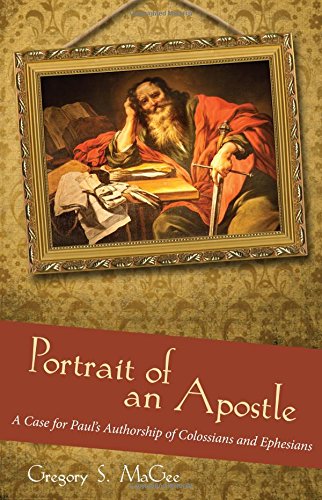Earlier, I reviewed Greg Magee’s published dissertation, Portrait of an Apostle: A Case for Paul’s Authorship of Colossians and Ephesians (Wipf & Stock, 2013), 204 pages. You can catch up on the review here. I found this book very creative and well executed, so I decided to ask Greg to write a reply to my review, hoping that he could sharpen my thinking a bit on a topic he spent years studying. He graciously replied, and we hope the discussion between us is fruitful and stimulating………
 Thanks for this opportunity to be in dialogue about my book. I have enjoyed reading the review and reflecting on its arguments. Here are a few of my thoughts in response:
Thanks for this opportunity to be in dialogue about my book. I have enjoyed reading the review and reflecting on its arguments. Here are a few of my thoughts in response:
To use a football analogy (we are entering football season, after all), I was not trying to win a whole football game with this book. I was not even trying to score a touchdown. I was trying to make a defensive stop, so that the other side would have to punt on this drive. Then I began what I hope is a successful offensive series of my own, but this is still part of a larger game. The authorship of Colossians and Ephesians is a complex topic made up of many series of plays and drives. I looked at one aspect of this topic and tried to respond to what I saw as a weak argument that skeptics of Pauline authorship were relying upon and offer arguments for a better way.
The authorship of Col/Eph is a complex topic made up of many series of plays and drives. Click To TweetBased on what I hoped to accomplish with my book, I would distance myself from any language like “proof” or “objective test” to describe what I was doing (and just to be sure that I didn’t use any of that language in the book, I did a word search of the files!). I agree with you that a project such as this would not be able to prove Paul’s authorship of the letters – certainly not in any comprehensive way.
My approach was more narrowly focused, as a response to what I saw as a weak line of argument against Pauline authorship that has gained momentum in the last century or so. The first chapter in the book tracks the history of this type of objection to Pauline authorship, and I call it the “Exalted Apostle Theory.” The theory alleges that there is evidence in Colossians and Ephesians that later writers were incorporating an idealized image of Paul into their pseudepigraphal writings in order to give their writings more of an authentic flavor. This idealized image drew upon commonly known features of Paul’s apostleship and ministry.
In the course of my research I found that this theory began with simple speculations that this might be the case, without an attempt to demonstrate that this was likely. As time went on, apart from any careful substantiation of the theory, later writers promoted the theory as an established and widely accepted position among Pauline scholars. I wanted my work to show that there was very little convincing evidence for this argument against Paul’s authorship of Colossians and Ephesians (and yet, the argument continues to be accepted by many commentators and scholars as part of the case against Pauline authorship).
 To cast doubt on this theory, I looked at the two pseudepigraphal works you mentioned, The Epistle to the Laodiceans and 3rd Corinthians. Though these are just two known examples of pseudepigraphy that do not exhaust the ways one could imitate Paul, they do show the challenge that is central to the pseudepigrapher’s task in epistolary literature. Here is the challenge: how does one construct a fresh account of Paul’s calling and ministry that both preserves key elements of Paul’s standard self-perception and fits comfortably within the larger letter?
To cast doubt on this theory, I looked at the two pseudepigraphal works you mentioned, The Epistle to the Laodiceans and 3rd Corinthians. Though these are just two known examples of pseudepigraphy that do not exhaust the ways one could imitate Paul, they do show the challenge that is central to the pseudepigrapher’s task in epistolary literature. Here is the challenge: how does one construct a fresh account of Paul’s calling and ministry that both preserves key elements of Paul’s standard self-perception and fits comfortably within the larger letter?
The personal nature of the material, centered on Paul’s own experiences and self-understanding, makes it even more challenging to successfully imitate. As a thought experiment, imagine trying to create a letter today that you hoped to pass off as Paul’s. The material that described Paul would need to sound like Paul and match his known self-portrait. The material would also need to fit into the letter comfortably (and not just be tacked on to give it a touch of authenticity). It would need to match the occasion, purpose, and argument of the letter as well.
That is where the “explanatory power” criteria comes into play. Skeptics of Pauline authorship create new (and drastically different) occasions, purposes, and arguments that match their belief that the “Paul” in Colossians and Ephesians is a fictitious Paul. The exegetical work I provide in the book is designed to show that this massive reconstruction of history is unnecessary. This type of approach is not objective, nor is it intended to be so. A compelling reading of the material that answers questions about authorship and background does not settle the issue for all skeptics but I believe that it does strengthen the credibility of the position I am supporting.
I applaud approaching the authorship debate from other directions as well. Studies that are conversant with the latest advances in stylometry or theories of register, such as the studies you alluded to briefly, could function to cast doubt on some of the other claims made by those who reject Paul’s authorship of the letters. I see the value of various approaches – some that are more statistically oriented and others that evaluate the explanatory power of various proposed readings.
Thanks again for sparking some good avenues of discussion with your questions. If you have further comments or questions, I’m happy to respond to those as well. I’ll be glad to see and interact with the results of your research in coming years!
Greg MaGee replies to @ExegeticalTools review of his work on Pauline pseudepigraphy in Ephesians / Colossians Click To TweetFind MaGee’s book here on Amazon.

2 comments